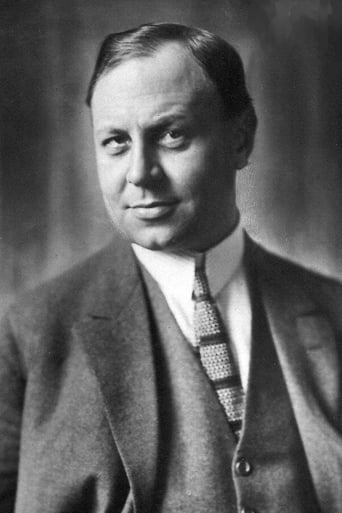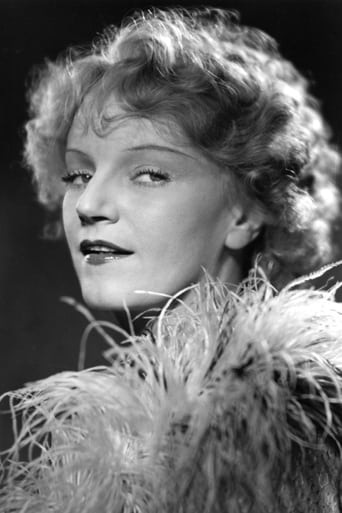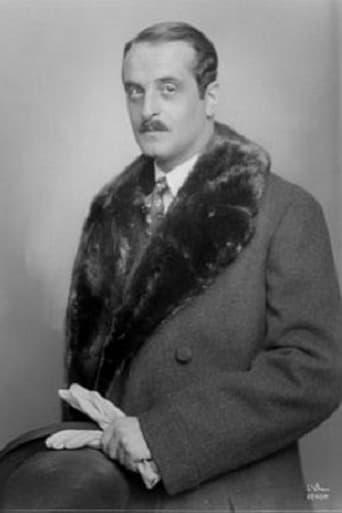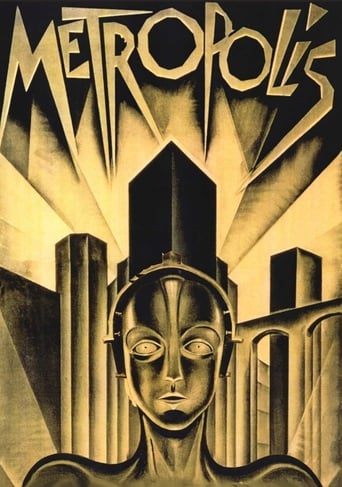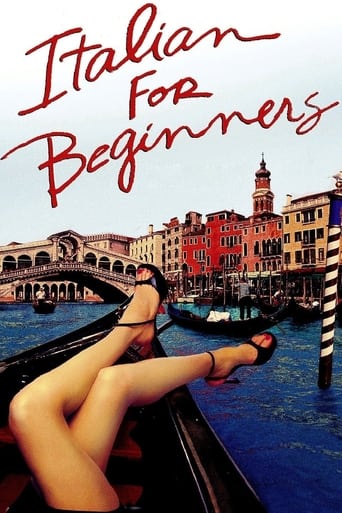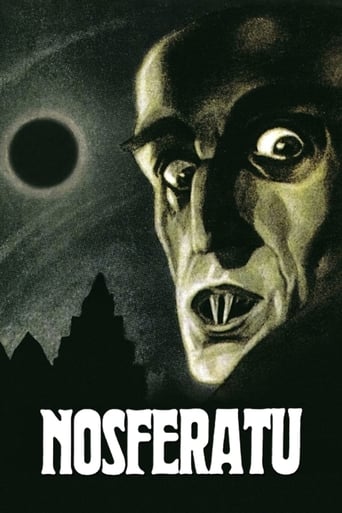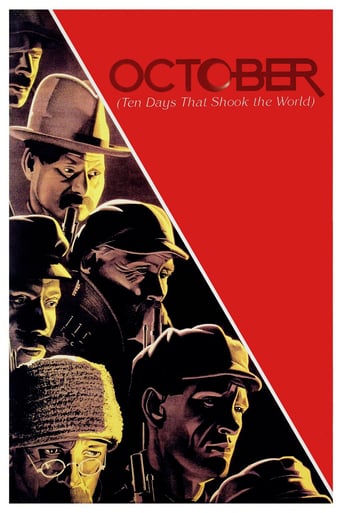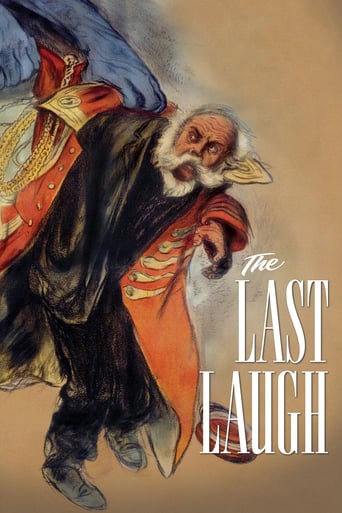
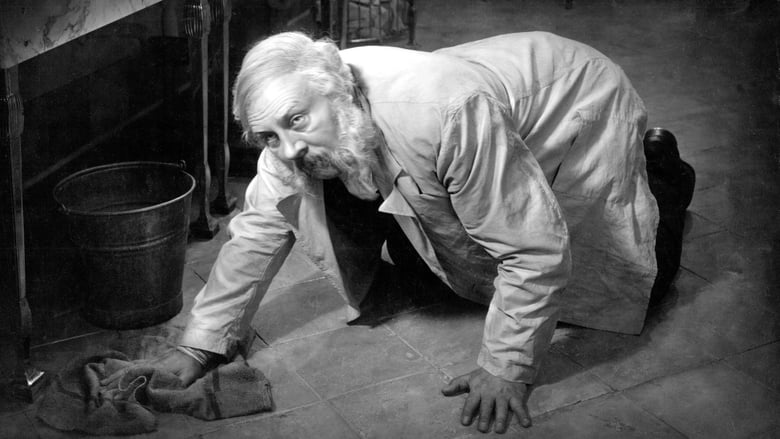
The Last Laugh (1924)
An aging doorman, after being fired from his prestigious job at a luxurious Hotel is forced to face the scorn of his friends, neighbours and society.
Watch Trailer
Cast
Similar titles

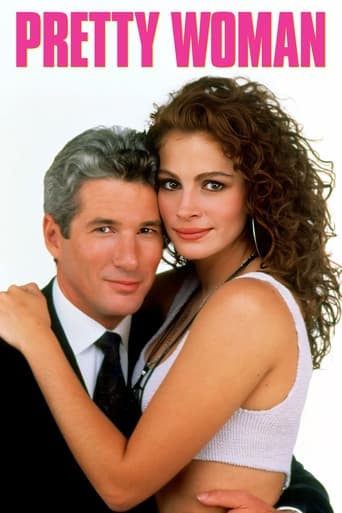
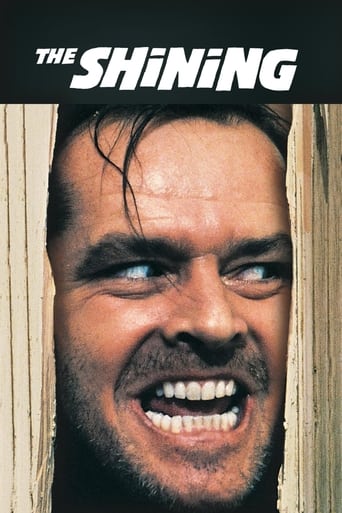

Reviews
Absolutely brilliant
It's the kind of movie you'll want to see a second time with someone who hasn't seen it yet, to remember what it was like to watch it for the first time.
The tone of this movie is interesting -- the stakes are both dramatic and high, but it's balanced with a lot of fun, tongue and cheek dialogue.
An old-fashioned movie made with new-fashioned finesse.
"The Last Laugh" tells a simple, yet heartbreakingly tragic tale (that ends disappointingly upbeat, but lets look at the film's positives).The film tells the story of a hotel doorman who, because of his old age, is brought down to the ranks of being just a bathroom attendant. The way this is all presented is incredibly powerful, with no use of intertitles, some of the most beautiful camera-work and directing I've ever seen (thanks to the brilliant director, F.W. Murnau), and a smashingly powerful performance by Emil Jannings.It is all dazzling to look at, since Murnau's lens is jam packed with creativity, movement, and beauty. Murnau almost makes the city seem alive, just like he did in the later 1927 classic "Sunrise". In some ways, this actually makes "The Last Laugh" a sort of prequel to "Sunrise" (not story wise, but cinematic wise).
From director F.W. Murnau (Nosferatu, a Symphony of Horrors, Sunrise), this German silent film was one in the book listing the 1001 Movies You Must See Before You Die, I knew nothing about the plot or title meaning, but I was keen. Basically this film tells the story of a respected, experienced and happy Hotel Doorman (Emil Jannings), he is proud of his position at the famous Atlantic Hotel, with his responsibilities, and dressed in his fancy decorated general-like uniform. One busy rainy night he takes a short break, having carried heavy a suitcase from the wet weather, and he is seen by his Manager (Hans Unterkircher) not performing his duties in that short time, so the next day the Doorman arrives for work and is surprised to see another man in his place, he has been replaced. The Doorman learns that he has been demoted and reassigned to the less strenuous but ultimately degrading position of washroom attendant, but this decision is also because he is considered too old and not the best image to represent the hotel. He tries to hide this demotion and new position from friends and family, but eventually he is discovered, he feels dire shame, his friends think he has been lying about having his former position the whole time, taunting him, while his family shun him due to their shame. The Doorman has no choice but to continue this job, despite feeling great grief, and he uses the bathroom he works in to sleep in, but he finds kindness in the Night Watchman (Georg John) who gives his a coat to cover himself with, but he continues to fall deeper into despair. The only title card that appears at this point says that in real life the story would end with the old man dying in sadness, but the story takes an improbable turn. The Doorman inherits a fortune from a Mexican millionaire, who died in his arms in the bathroom, he later returns to the hotel he worked a happy man to dine with great amounts of food, he is joined by the Night Watchman. The final moments of the film see The Doorman respected once again, now as a rich and valued man, he and the Night Watchman get ready to leave in their horse and carriage, and they are approached by a beggar who asks for money or food, and taking pity on him the men allow him to ride with them in the carriage. Also starring Maly Delschaft as The Doorman's Daughter, Max Hiller as the Daughter's Fiancé, Emilie Kurz as the Fiancé's Aunt, Olaf Storm as as Young Guest and Emmy Wyda as a Thin Neighbor. I suppose the title meaning is to do with the slightly unfathomable and not fully explained happy ending, this was put in on insistence by the producer, probably so audiences would not complain, this could easily be seen as a dream sequence. The film is filled with great black and white imagery, including city backgrounds and hotel interiors, good costumes, Jannings is a wonderful character to sympathise with, and there is no need for any written dialogue because all the visual emotions grab you, a fantastic classic silent drama. Very good!
F.W. Murnau's "The Last Laugh" was the climax of Kammerspiel with its outstanding cinematography, composition and naturalist acting. However, due to the director's remarkable production of the darker variant, the film is often mistaken as a masterpiece of expressionism. As an entirety, the film works as a perfect expression of the mentality and mood that prevailed in Germany between WWI and WWII. The injustice and gloomy atmosphere which finally led to Hitler's rise to power. The film was written by Carl Mayer who was not only the father of Kammerspiel but has also often been considered as the most prominent filmic author in the Weimar Republic. Mayer's scripts are literate film poems, all of which are characterized by profound but yet simple psychological structure. For Mayer, film was, first of all, meant to give form to primitive passions. Moreover, Murnau's unique ability to "think and feel directly in images" gives the film a poetic dimension which drills down into the depths of the human soul.The protagonist of "The Last Laugh" is a respectable doorman who enjoys great appreciation at home and neighborhood. On one day, however, he gets a discount to a lavatory cleaner, and experiences a poignant social humiliation. Unfortunately, he is unable to accept the situation and, therefore, sinks into the dim abyss of self-loathe. The scene in which the protagonist loses his job, represented by the doorman coat, tears the viewer's heart apart with its authentic emotion of despair, submission and loss. He becomes a living dead, so to speak. In fact, all the action built around the coat highlights the ever-worsening existence of the protagonist -- on both social and existential levels.Already in the beginning, Murnau defines the contrasts of the class society, commonly for Kammerspiel, through the visual polarization of architecture: the glowing skyscrapers and the luxury hotel (where the doorman works) meet the gruesome aesthetics of the bleak block where the poor live in misery. The latter is definitely a milieu of deceit and exploitation whereas the former consists of elements -- the elevator and the revolving door -- which enable the hectic lifestyle of the hotel's quests. As a matter of fact, the revolving door becomes a fantastic visual motif of the film. It's the quick doorway of the class society which, at random, let's people inside while leaving others outside. It is made very certain that at any moment any one, who has once got in, can, in future, be thrown out.When it comes to progressive cinematography, "The Last Laugh" was a marvelous achievement. Total mobilization of the camera was presented for the first time on the screen hence the film had a tremendous influence on Hollywood cinema. The camera tracks, pans and heels all being. This not only creates brilliant narrative but also makes it possible for the spectator to observe reality from various vantage points. Specifically, the film was revolutionary because the subjective perspective was transformed to the camera-work. Yet, technique is never self-deliberate for it is constantly related to the film's theme of humiliation. During long takes, the camera shares the experience of social abasement with the protagonist. It goes through the emotions of shame and guilt. The camera might even displace the protagonist if Emil Jannings wasn't so outstanding and superb in his performance. As a genre or avantgardist movement, Kammerspiel produced a great amount of touching and progressive films with minimalist settings even if it never reached the aesthetic level of German Expressionism. Nonetheless, visually speaking, Murnau depicts humiliation, pride and shame in an utterly beautiful fashion. To my mind, Murnau even achieves to give the visual form for Marx's idea of the relation between work and human consciousness. And, in this sense, "The Last Laugh" is a poignant analysis of hierarchy in the class society, and a study on the significance and loss of social status -- its authoritarian and destructive impact on both the community and the psyche of the individual. At its heart, "The Last Laugh" is a portrayal of a man's slow and painful process of abasement, sinking lower and lower.
The camera work and the sets in this film where so breathtaking and powerful that they changed the film language forever. It is in many ways the Citizen Kane of its time.It was so revolutionary that Hollywood (Fox) tried desperately to get Murnau to work for them and teach them how to do all these things (which he did some years later). The main revolutionary thing was the fluidity of the camera (or the unchanged camera, as it was called). There was no steady cam at this time, but still they managed to strap the camera to the body of the cameraman without getting a shaky pictures.The set is just amazing. It is difficult to believe that this is not a real city. All the special effects help also to make this believable (special effects that are still today astonishing and believable).The makeup is also great. Emil Jannings was only 40 years old when he made this film but he really looks like an old man (and acts like one too).But the greatest thing about this film is how much Murnau manages to say with out the help of inter titles. This is visual storytelling at it's best.Murnau had come a long way from Nosferatu but he still had a long way to go and a lot to teach us before his untimely death. The Last Laugh is not only one of his best films, it is also most likely his most important one, and one of the most important films in film history.
